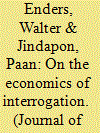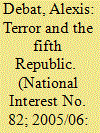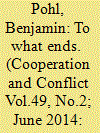| Srl | Item |
| 1 |
ID:
106022


|
|
|
|
|
| Publication |
2011.
|
| Summary/Abstract |
While military protocol requires that POWs provide only name, rank, serial number, and date of birth (the so-called Big 4), it is naive to think that all detainees, including terrorists, behave in this fashion. Instead, there is evidence that detainees partially cooperate with their captors by revealing a limited amount of valuable information during the interrogation process. Such a strategy makes it appear that the detainee is cooperative and, since interrogations can be costly, serves as a disincentive for further interrogation. In order to capture the essential differences between the two strategies, we model two different types of games between the interrogator and the detainee. Specifically, we compare the Big 4 game to a two-stage game (the Little Fish game) in which the detainee is permitted to reveal low-level information to the interrogator. We formalize both games, derive the optimal rules for each player, and show that the Big 4 game may not be optimal for either player or for the overall well-being of the interrogating nation. As such, the Little Fish game can Pareto-dominate the Big 4 game. Hence, it is possible that the al-Qaeda strategy of partial cooperation is superior to that used by most standing armies. We also show that the level of intensity selected by the interrogator must be balanced by such factors as the moral values of the society and recruiting potential of the terrorists versus the likelihood of obtaining important information.
|
|
|
|
|
|
|
|
|
|
|
|
|
|
|
|
| 2 |
ID:
072027


|
|
|
| 3 |
ID:
132328


|
|
|
|
|
| Publication |
2014.
|
| Summary/Abstract |
Since the EU's Common Security and Defence Policy framework became operational in 2003, the Union has undertaken more than 20 crisis management operations. The drivers behind this activity remain debated. This article proposes a fresh interpretation based on governmental interests as defined by domestic political risks and opportunities. It argues that EU governments have tailored Common Security and Defence Policy action so as to satisfy domestic audiences. By way of illustration, this article examines the most ambitious Common Security and Defence Policy operation to date, the EU Force mission in Chad and the Central African Republic, as well as a deliberate non-intervention in a comparable case, in the eastern Democratic Republic of Congo in late 2008. By analysing the positions of the most relevant EU governments in each respective case, this article demonstrates how they corresponded to domestic political logic. Drawing on some 20 interviews with policy-makers, this article provides a theoretical account explaining the motives behind Common Security and Defence Policy decision-making rooted in original empirical evidence. The explanation for the haphazard pattern of Common Security and Defence Policy operations thus far can be found in the link between domestic politics and EU crisis management operations.
|
|
|
|
|
|
|
|
|
|
|
|
|
|
|
|